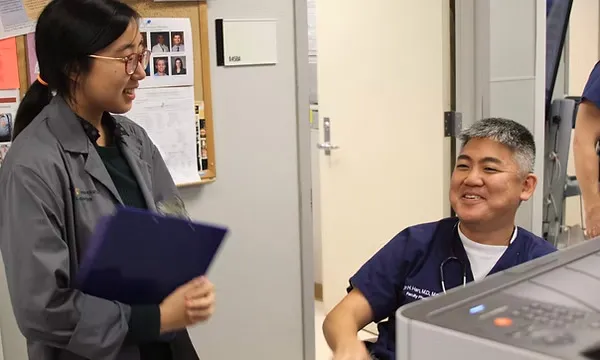Emergency Medicine Research Training
Patient-centered EM research at every training level
The Vanderbilt University Medical Center Department of Emergency Medicine Division of Research offers several levels of research training in emergency care research.
At the medical student, resident, and fellow levels, we provide a collaborative approach to training in patient-centered emergency care.
We have international experts in pragmatic clinical trials, clinical trial design, patient-oriented research transcending numerous clinical disciplines including cardiology, infectious diseases, critical care, geriatrics, and healthcare delivery science.

Training by level
Regardless of level, training in emergency care research is designed to encourage the process of scientific inquiry, development of research questions, and to design and implement methodological approach to answering research questions.
Our division offers both informal and formal training opportunities to trainees at the medical student, resident and fellowship levels.
We invite postdoctoral investigators to learn more about the VISTA NHLBI T32 Training Program, a new opportunity available for postdocs focused on mentorship and jumpstarting careers as independent scientists.
Residents
Resident research projects are developed with their professional goals in mind, recognizing that they do not have the same amount of time to dedicate to research that individuals at other career stages.
Resident research projects are conducted in the first year of residency as a group. They are led by a senior resident and mentored by the Research Division. The revised research program was published in 2024 and is described in the article "Development and results of a novel emergency medicine residency research immersion program."
Projects meet the ACGME’s scholarship requirement and are submitted for national meetings and/or to a peer-reviewed journal. Prior examples include the following:
Fellows
Mentored research fellowships are available to individuals who desire a career in emergency care research. The goal of the research fellowship is to prepare fellows for a career as an independent investigator in clinical and translational research.
Our research division is highly collaborative and has trained fellows from emergency medicine, critical care, cardiology, nursing, and health policy backgrounds.
Individuals are considered on a case-by-case basis as each experience is highly customized to each investigator. Historically, fellowships have been two years and combine both didactic and experiential learning with 75% protected time for research.
Most fellows have earned either a Master in Public Health (MPH) through Vanderbilt University or a Master of Science in Clinical Investigation (MSCI) through Vanderbilt University School of Medicine.
- Limitations in the use of automated mental status detection for clinical decision support
- Association Between Neuromuscular Blocking Agents and Outcomes of Emergency Tracheal Intubation: A Secondary Analysis of Randomized Trials
- Electronic personal protective equipment: A strategy to protect emergency department providers in the age of COVID-19
- The flex track: flexible partitioning between low- and high-acuity areas of an emergency department

Undergraduates
Experiences at the undergraduate level vary in their availability, timing, and mentoring.
Formal summer opportunities at Vanderbilt provide funding while offering a structured program for students considering a career in healthcare, research and/or medicine. Two potential summer options include:
Undergraduate Clinical Research Internship Program (UCRIP): Gives college students earning a four-year degree the opportunity to participate in both research and clinical patient care at an academic medical center. This program is designed for students who are interested in a career in medicine.
Summer Research Internship Program in Biomedical Informatics: Directed by Kim Unertl, PhD, this is designed to provide students from all backgrounds with a high-quality biomedical informatics research experience, encouraging students to consider pursuing PhDs and research careers in the field.
Medical Students
Mentored experience through Vanderbilt’s PLAN and Research Immersion phase starts in a medical student’s second year with development of a project and includes a one-month PLAN course focused on refining the student’s research question.
The program includes a three-month dedicated research experience typically in the late fall/early winter. Projects can usually be adapted and extended to further meet the quality improvement (QI) requirements of the Vanderbilt University School of Medicine.
Prior research projects have been funded by the Emergency Medicine Foundation and published as co- and first author roles.
- Using discrete event computer simulation to improve patient flow in a Ghanaian acute care hospital
- Implementation of a pilot electronic stroke outcome reporting system for emergency care providers (QI)
- Inter-facility transfer for patients with acute large vessel occlusion stroke receiving mechanical thrombectomy
- A Time and Motion Analysis of Nursing Workload and Electronic Health Record Use in the Emergency Department
- Association of insurance status with potentially avoidable transfers to an academic emergency department: A retrospective observational study
- Tales from the Trips: A Qualitative Study of Timely Recognition, Treatment, and Transfer of Emergency Department Patients with Acute Ischemic Stroke
